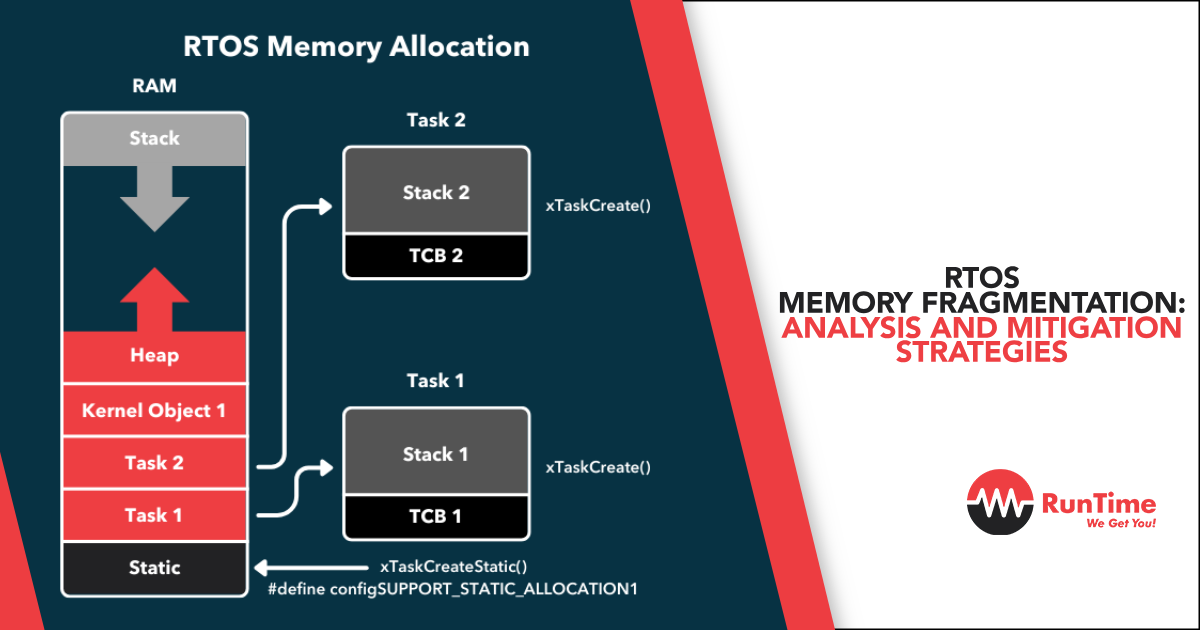Real-time operating systems (RTOS) are a critical component of embedded systems. They ensure that tasks are executed within strict time constraints, providing deterministic behavior. In industries such as automotive, aerospace, and telecommunications, RTOS play a vital role in maintaining safety and reliability. By managing resources, RTOS enable developers to build complex applications that can handle multiple tasks concurrently.
Efficient memory management is essential for the smooth functioning of an RTOS. It enables optimal use of limited resources, maximizing performance and stability. Moreover, effective memory management is vital for preventing system crashes and ensuring the successful execution of time-sensitive tasks. Consequently, developers must carefully consider the various aspects of memory management when designing and implementing RTOS-based applications.
Memory management in RTOS presents several challenges, one of which is memory fragmentation. Fragmentation occurs when memory is allocated and deallocated in a manner that leaves unusable gaps, hindering the efficient use of available memory. Over time, fragmentation can lead to a significant decrease in system performance, resulting in missed deadlines and potential system failures.
In this article, we delve into the specifics of memory fragmentation, analyze its impact on RTOS, and discuss effective mitigation strategies. By understanding and addressing memory fragmentation, developers can optimize their RTOS-based applications, ensuring the highest levels of performance and reliability.
Memory Fragmentation: An Overview
Definition of Memory Fragmentation
Memory fragmentation is a phenomenon that occurs when available memory is divided into non-contiguous blocks. This results in inefficient memory utilization, as the gaps between allocated blocks are too small to be used effectively. Over time, fragmentation can significantly degrade system performance, making it difficult for an RTOS to allocate memory for new tasks or operations.
Types of Memory Fragmentation: External and Internal
There are two main types of memory fragmentation: external and internal. External fragmentation occurs when free memory is scattered throughout the system, leaving gaps between allocated blocks. This fragmentation type can make it difficult to find a contiguous block of memory large enough to accommodate a new request, even if there is sufficient free memory available.
Internal fragmentation, on the other hand, happens when memory is allocated in fixed-size blocks. When a requested memory size is smaller than the allocated block, the difference between the block size and the request size is wasted.
This waste can accumulate over time, leading to a reduction in available memory.Both types of fragmentation can negatively impact the performance and stability of an RTOS-based system.
Causes of Memory Fragmentation in RTOS
Several factors contribute to memory fragmentation in RTOS, including:
- Memory allocation and deallocation patterns: Frequent allocation and deallocation of varying memory sizes can lead to gaps in the available memory, resulting in fragmentation.
- Inefficient memory allocation algorithms: Some memory allocation algorithms may exacerbate fragmentation by not efficiently distributing memory requests among available blocks.
- Task scheduling and prioritization: The execution order of tasks in an RTOS can influence memory allocation patterns, potentially leading to fragmentation.
- Memory block size: Fixed-size memory blocks can cause internal fragmentation, particularly when the block sizes do not match the memory requests.
By understanding and addressing these causes, developers can minimize memory fragmentation in their RTOS-based systems, resulting in better performance and stability.
Analysis of Memory Fragmentation in RTOS
Identifying Symptoms of Memory Fragmentation
Recognizing the symptoms of memory fragmentation is essential for addressing the issue. Some common signs of memory fragmentation in RTOS include:
- Slower system performance: Fragmentation can cause RTOS tasks to take longer to execute, leading to a decline in overall system performance.
- Increased memory allocation failures: As fragmentation progresses, memory allocation requests are more likely to fail, even if there is sufficient free memory.
- Inability to allocate large memory blocks: Fragmentation can make it difficult to allocate large, contiguous memory blocks, as free memory becomes scattered throughout the system.
By monitoring these symptoms, developers can quickly identify memory fragmentation issues and take appropriate actions to mitigate them.
Impact of Memory Fragmentation on System Performance
Memory fragmentation can have significant consequences for system performance in RTOS-based applications. Some key impacts include:
- Decreased efficiency: Fragmentation can cause memory waste, as small, unusable gaps are left between allocated blocks. This inefficiency can lead to reduced system performance, particularly in resource-constrained environments.
- Increased task execution times: Fragmentation can cause delays in task execution, as the RTOS must search for available memory blocks that meet the requirements of each task. These delays can accumulate over time, resulting in missed deadlines and degraded system performance.
- System instability: In extreme cases, memory fragmentation can lead to system crashes or failures, as the RTOS becomes unable to allocate memory for critical tasks. This instability can have serious consequences in safety-critical applications such as automotive or aerospace systems.
By understanding the impact of memory fragmentation on system performance, developers can prioritize efforts to address the issue and optimize their RTOS-based applications.
Common Scenarios Leading to Fragmentation in RTOS
There are several scenarios that can contribute to memory fragmentation in RTOS, including:
- Frequent allocation and deallocation of varying memory sizes: This common pattern can result in gaps in the available memory, leading to fragmentation.
- Inefficient task scheduling: Task execution order can influence memory allocation patterns and contribute to fragmentation.
- Inadequate memory allocation algorithms: Some memory allocation algorithms may exacerbate fragmentation by not efficiently distributing memory requests among available blocks.
- Use of fixed-size memory blocks: Employing fixed-size memory blocks can cause internal fragmentation, especially when the block sizes do not match memory request sizes.
By identifying and addressing these scenarios, developers can minimize memory fragmentation in their RTOS-based systems, ensuring better performance and reliability.
Mitigation Strategies for Memory Fragmentation in RTOS
Memory Allocation Algorithms
1. First-fit, Best-fit, and Worst-fit Algorithms
There are several memory allocation algorithms that can be employed in RTOS to mitigate fragmentation, including first-fit, best-fit, and worst-fit algorithms. The first-fit algorithm searches for the first available memory block that is large enough to accommodate the requested size.
The best-fit algorithm, on the other hand, searches for the smallest block that can fit the requested size, aiming to minimize wasted space. The worst-fit algorithm allocates the largest available block, leaving as much free space as possible for future allocations.
2. Pros and Cons of Each Algorithm
Each algorithm has its advantages and disadvantages. The first-fit algorithm is generally faster than the other two, as it stops searching once a suitable block is found. However, it may lead to higher fragmentation.
The best-fit algorithm tends to produce less fragmentation but can be slower, as it searches for the optimal block. The worst-fit algorithm can be useful in scenarios where large memory blocks are frequently required, but it may lead to higher fragmentation in other cases.
3. Choosing the Right Algorithm for Specific RTOS Applications
Choosing the appropriate memory allocation algorithm depends on the specific requirements of the RTOS application. Factors such as the frequency and size of memory requests, the available memory size, and the desired system performance should be considered when selecting an algorithm.
By carefully evaluating these factors, developers can choose the most suitable algorithm to minimize fragmentation and optimize system performance.
Memory Defragmentation Techniques
1. Garbage Collection
Garbage collection is a technique that automatically identifies and reclaims memory blocks that are no longer in use. This process can help reduce fragmentation by consolidating free memory. However, garbage collection can introduce overhead and may impact real-time performance, making it less suitable for some RTOS applications.
2. Compaction
Compaction is a technique that relocates allocated memory blocks to create contiguous free memory space. This process can help reduce external fragmentation, but it may require significant processing resources and can temporarily interrupt system operation.
3. Memory Pool Management
Memory pool management involves pre-allocating fixed-size memory blocks and grouping them into pools. When a memory request is made, a block from the appropriate pool is allocated. This technique can help reduce both internal and external fragmentation by ensuring that memory requests are fulfilled using blocks of the correct size.
4. Comparison of Defragmentation Techniques and Their Effectiveness in RTOS
Each defragmentation technique has its advantages and drawbacks, and its effectiveness depends on the specific RTOS application. Developers should consider factors such as the frequency and size of memory requests, the desired system performance, and the available processing resources when selecting a defragmentation technique to minimize fragmentation and optimize system performance.
Preventive Measures
Efficient Memory Allocation and Deallocation Practices
Developers can minimize fragmentation by implementing efficient memory allocation and deallocation practices. These practices include allocating memory in a manner that reduces fragmentation, deallocating memory when it is no longer needed, and reusing memory blocks whenever possible.
Programming Techniques to Minimize Fragmentation
Adopting programming techniques that minimize fragmentation can help improve system performance. For example, using memory pools, allocating memory in larger blocks, and deallocating memory in the reverse order of allocation can all help reduce fragmentation in RTOS applications.
Monitoring and Analyzing Memory Usage Patterns
Regularly monitoring and analyzing memory usage patterns can help developers identify fragmentation issues early and take appropriate action. By keeping track of memory allocation and deallocation events, developers can gain insights into the causes of fragmentation and implement effective strategies to mitigate its impact on system performance.
Case Studies: Successful Memory Fragmentation Management in RTOS
Examples of RTOS Implementations That Effectively Managed Memory Fragmentation
Several RTOS implementations have successfully managed memory fragmentation, demonstrating the effectiveness of various mitigation strategies. Some examples include:
- Automotive systems: In advanced driver assistance systems (ADAS), developers have employed memory pools and efficient allocation algorithms to minimize fragmentation and maintain real-time performance.
- Aerospace systems: In safety-critical avionics applications, developers have used garbage collection and compaction techniques to manage fragmentation, ensuring reliable system operation.
- Telecommunication systems: In high-performance telecommunication devices, developers have implemented custom memory allocation algorithms and defragmentation techniques to reduce fragmentation and optimize system performance.
These examples showcase the importance of understanding and addressing memory fragmentation in RTOS applications across various industries.
Key Takeaways from These Case Studies
Some key takeaways from these successful memory fragmentation management case studies include:
- The importance of selecting appropriate memory allocation algorithms and defragmentation techniques based on the specific requirements of the RTOS application.
- The benefits of employing preventive measures such as efficient memory allocation and deallocation practices, programming techniques to minimize fragmentation, and regular monitoring and analysis of memory usage patterns.
- The need for continuous improvement and optimization of memory management practices to ensure the highest levels of system performance and reliability.
Lessons Learned and Best Practices for Managing Memory Fragmentation in RTOS
Based on these case studies, developers can apply several best practices to manage memory fragmentation in their RTOS applications:
- Choose the right memory allocation algorithm and defragmentation technique based on the application’s requirements and constraints.
- Implement efficient memory allocation and deallocation practices to minimize fragmentation.
- Employ programming techniques that reduce fragmentation, such as using memory pools and allocating memory in larger blocks.
- Monitor and analyze memory usage patterns regularly to identify fragmentation issues early and take appropriate action.
- Continuously improve and optimize memory management practices to maintain high levels of system performance and reliability.
By applying these best practices, developers can effectively manage memory fragmentation in their RTOS applications, ensuring optimal performance and stability.
Conclusion
Proper memory management is essential for the success of RTOS-based applications. It ensures optimal system performance, stability, and reliability in resource-constrained environments.
By understanding the challenges of memory fragmentation and implementing effective mitigation strategies, developers can optimize their RTOS applications and meet the strict requirements of various industries.
This article has provided an in-depth overview of memory fragmentation in RTOS, its impact on system performance, and various mitigation strategies. Key points include the importance of selecting appropriate memory allocation algorithms, implementing efficient memory defragmentation techniques, and employing preventive measures to minimize fragmentation. By applying these strategies, developers can effectively manage memory fragmentation and optimize their RTOS applications.
At RunTime Recruitment, we understand the importance of continuous improvement and optimization in the field of engineering recruitment. We encourage developers to stay up-to-date with the latest advancements in memory management practices and continually refine their RTOS applications for better system performance.
As a trusted partner in engineering recruitment, we are committed to helping our clients and candidates achieve success in their careers and projects. By working together, we can overcome the challenges posed by memory fragmentation and build more robust, reliable, and efficient RTOS-based systems.
Hire Highly-Skilled Engineers with RunTime Recruitment
Our expert team of engineers-turned-recruiters offers in-depth technical recruiting knowledge in the engineering industry.
If your company is looking to recruit highly-skilled engineers worldwide, contact us today and we will do the sourcing for you. Or if you’re an engineer looking for new opportunities, you can check RunTime Recruitment’s job site for job vacancies.









